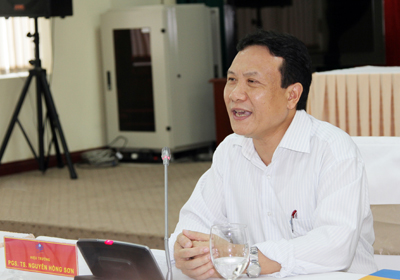
Assoc.Prof.Dr. Nguyen Hong Son - Rector of VNU University of Economics and Business
In recent years, planning activity (including making plans, monitoring, evaluating the implementation) is always paid a specia attention at VNU University of Economics and Business in its progress to a world-class research-oriented university. On September 15th 2011, offices and centers of UEB signed the commitment to academic year 2011-2012 mission delivery. To understand more about the planning in general and academic year 2011-2012’s mission of the UEB, we had a discussion with Assoc.Prof.Dr. Nguyen Hong Son - UEB Rector.
- Assoc.Prof.Dr. Nguyen Hong Son, would you please share some points about the planning at UEB?
Bearing in mind that plans are not only tools of management but also the mobilization and allocation resources to deliver medium and long term objectives. Right from the beginning, the UEB has attached special importance to making plans. Every year, in July, we start making plans for the next academic year’s mission in parallel with academic year closure. Planning process is in accordance with ISO procedures whereby systems of planning criteria are specified and made quantitative so that they are measurable. Accordingly, at university level, the UEB Management Board sets directions, focal duties, and general norm framework of training, scientific research, human resourcesmanagement... From those directions and focal duties, UEB units base on their own capabilities, specific conditions and objectives to propose detailed mission plan attached with implementation conditions in terms of finance, human resources and facilities. Basing on units’ mission plans, functional offices including Office of Planning - Finance acts as a co-ordinator to balance and allocate planning norms of operational areas for those units. Plans allocated to units are the results of “reasonable agreement” between them and UEB Management Board.. The monitoring and evaluation of plan implementation is carried out since tasks are assigned to academic year closure. Besides, the UEB has a network of planning staff in each unit (divisions/offices/teams/faculties/centers) directly involved in the monitoring and evaluation of completion level.
- Does the “reasonable agreement” you mentioned show the roles of units in UEB’s planning?
“Reasonable agreement” here can be seen as a harmonized cooperation between bottom-up and top-down processes. Top-down process means that the Management Board sets directive targets/norms, expected quantitative results and general resources, while the UEB units are self-controlled in bottom-up planning, provided the targets and planned norms are achieved within available resources. However, targets set forth to units originate from them, not one-way direction from the Board. The active participation in the planning process of the UEB enhances role and accountability of units, especially unit leaders.
- Planning is thought to be a closed process, including the assessment, plan making, monitoring and evaluation. What is the key step, in your opinion?
Actual planning process at the UEB has shown that no single step should be underestimated. However, I personally think that the monitoring and evaluation of the implementing planned targets is the most important and this is also the current shortcomings in general planning. Although the definition of sets of planned norms is difficult but still possible; while the results assessment is the most difficult and this is what UEB is aiming. Generally speaking, no matter you make feasible a plan and implement it; if results are not measurable, it is not easy to point out either success or failure. If success is not defined, we cannot have proper and timely rewards. In other words, we will not encourage units and individuals who successfully finished their planned duties.
- We have learnt that this year, the UEB has renovated its planning. Could you clarify more on this new improvement?
As I mentioned earlier, the UEB is aiming at building an efficient monitoring and evaluation system. Consequently, it is important to define clearly expected outputs; organize the monitoring and evaluation of results with active participation of relevant units. Previously, the evaluation was done but it was only measuring activities implemented; but in the near future, the university is going to focus its management on outputs, outcomes and their effectiveness. However, this is not complete denial of monitoring inputs/activities but minor attention to inputs/activities and creates more flexibility for units in implementing their mission, helping them to find the best solutions to carry out plans.
- In your opinion, what is the most important factor to achieve assigned norms?
Realizing plans depends on many factors, among which the first to mention is planned norms. It is required the planned norms are highly feasible and qualitative with clear indicators. The second factor is resources. Assigning tasks needs to accompany with other resources during implementation, within available conditions and framework of the university. The last factor is the leader’s commitment. In my opinion, this is the most important factor to the success in delivering tasks. Once committed, units will actively attract resources and manage to fulfill mission, not wait for the university.
- In order to successfully implement missions of academic year 2011-2012, what solutions did the UEB have?
In academic year 2011-2012, the UEB is required to fulfill focal duties listed in the plans. Hence, the solutions are: (i) developing, completing and implementing specific schemes for focal duties, especially schemes within strategic mission framework, human resources development schemes, enhancing and better utilizing financial resources, developing and efficiently utilizing facilities...; (ii) determined directives and investment in establishing interdisciplinary research teams with specific programs and typical outcomes. Based on those research programs, the UEB will look for local and overseas partners having demands and financial capability to implement; (iii) make optimal use of partnership with enterprises, alumni to call for support to diversify income for UEB activities; (iv) making the best use of support from higher level (VNU, Ministry of Education & Training) and relevant organizations as well as seeking for major international projects; (v) creating a favorable environment and working conditions for units to actively and creatively fulfill their tasks.
- Thank you and hope that the UEB will successfully fulfill its missions of academic year 2011-2012!